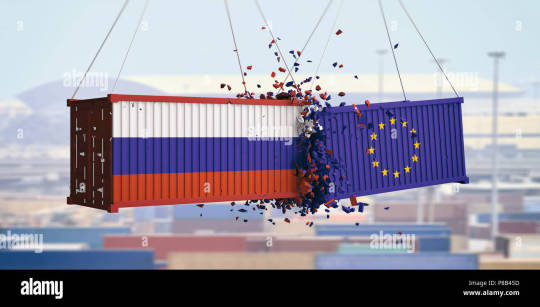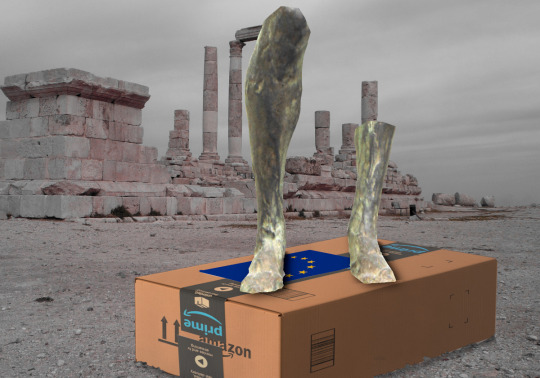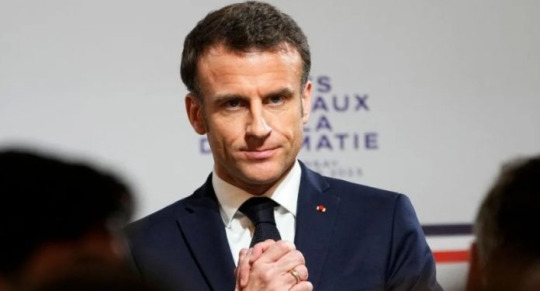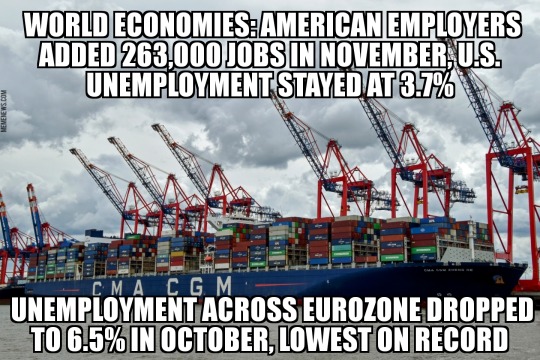#eu economy
Text

🇪🇺🇷🇺 🚨 TRADE BETWEEN THE EU AND THE RUSSIAN FEDERATION DOWN 37% SINCE FEBRUARY 2022
According to German news agency Der Spiegel, a study by the IFO Institute has found that European Union exports have fallen 37% since the start of Russia's Special Military Operation in Ukraine, which began on Feb. 24th, 2022.
"One reason for the still high export volume to Russia is that only 32 percent of all products from the EU are sanctioned," Feodora Teti, the Deputy-chief of the IFO Institute's Center for Foreign Trade, said on Tuesday.
"For luxury goods, for example, the export of champagne to Russia is sanctioned, but not Prosecco," Teti said.
Recent evaluations of IFO's new sanctions database suggest many of the sanctioned goods can be delivered to the Russian Federation indirectly via third countries.
"For Russia, China is the most important alternative country of origin for sanctioned products: 61 percent of these goods come from China," Teti added.
Prior to the war in Ukraine, that proportion was only 35%. Currently, 13% of all goods sanctioned by Western countries enter Russia via Turkey, while less than 1% arrives via Armenia. During the same period, EU exports to Armenia doubled.
#source
@WorkerSolidarityNews
#european union#eu#eu news#europe#europe news#european news#russia#russian federation#russia news#russian news#russian economy#germany#germany news#german news#eu politics#eu trade#eu economy#eu economics#politics#news#geopolitics#world news#global news#international news#breaking news#current events#trade#economy#economics#economy news
9 notes
·
View notes
Text
EU secured agreement to stop sending waste to countries incapable of recycling it
EU member states and lawmakers have reviewed bloc’s rules on transporting waste and halting exports of certain types of waste to third countries that cannot properly treat it, Reuters reports.
“Exports of certain non-hazardous wastes and mixtures of non-hazardous wastes (…) will be allowed only to those non-OECD countries that consent and fulfil the criteria to treat such waste in an environmentally sound manner.”
The Parliament added that respect for international workers’ rights would also be taken into account. The European Commission proposed in 2021 to overhaul EU rules on waste disposal to make it harder for member states to offload rubbish to more impoverished countries.
The EU will finally assume responsibility for its plastic waste by banning its export to non-OECD countries.
EU countries must stop sending plastic waste to poorer countries within two and a half years after legislation comes into force, parliament has said.
Read more HERE

#world news#world politics#news#europe#european news#european union#eu politics#eu news#eu foreign policy#eu law#eu economy#waste management#waste removal#recycling#oecd
3 notes
·
View notes
Text
0 notes
Text
The Return of Austerity
The negotiations on the reform of the EU’s fiscal rules have entered the very last phase. The inter-institutional negotiations between the European Parliament, member states in the European Council and the European Commission, known as the trilogues, mainly undertaken by civil servants have begun.
Officially, trilogues will only deal with the so-called “preventive arm” of the new fiscal rules,…
View On WordPress
0 notes
Text
🇬🇧 Of course we were right, even with a 💩 deal which does no favours to the people on both sides of the Channel. We the 🇬🇧 get to say who gets to rob us, not 🇪🇺 and we the 🇬🇧 would like to see more of the people from the 🇪🇺 on our shores but they can't come in account of the aforesaid 💩 deal. We didn't get 🔩, 🇪🇺 got 🔩! Work, it, work it 🇬🇧
0 notes
Text
Interview of S.Mavroudeas for EL CONFIDENTIAL on the state of the EU and the Greek economy
This is the English transcript of an interview of S.Mavroudeas for the spanish site EL CONFIDENCIAL (https://www.elconfidencial.com/). Its subject is the state of the EU and the Greek economy. The Spanish translation will appear on the 25th of August 2023.
View this document on Scribd

View On WordPress
0 notes
Text
How Amazon transformed the EU into a planned economy

Amazon is a perfect parable of enshittification, the process by which platforms first offer subsidies to end users until they’re locked in, then make life good for business customers at users’ expense, until they’re locked in, then claw back all the value they can for themselves, leaving just enough behind to keep the lock-in going.
In a new report for SOMO, Margarida Silva describes how the end-stage enshittification of Amazon is playing out in the EU, with Amazon repeating its US playbook of gouging the small businesses who have no choice but to use the platform in order to reach its locked-in customers, making European customers and European sellers poorer:
https://www.somo.nl/amazons-european-chokehold/
The mechanism for this isn’t a mystery. Amazon boasts about it! They call it their flywheel: first, customers are lured into the platform with low prices, especially through Prime, which requires pre-payment for a year’s shipping, which virtually guarantees that customers will start their shopping on Amazon. Because customers now start their buying on Amazon, sellers have to be there. The increased range of goods for sale on Amazon lures in more buyers, who lure in more sellers, with both sides holding each other hostage:
https://vimeo.com/739486256/00a0a7379a
This flywheel creates a vicious cycle, starving local retail so that customers can’t get what they need from brick-and-mortar shops, which funnels sellers into offering their goods for sale on Amazon. The less choice customers and sellers have about where they shop, the more Amazon can abuse both to pad its own bottom line.
There are 800,000 EU-based sellers on Amazon, and they have seen the junk-fees that Amazon charges them skyrocket, to the point where they have to raise prices or lose money on each sale. Amazon uses both tacit and explicit “Most Favored Nation” deals to hide these price-hikes. Under an MFN deal, sellers must not allow their goods to be sold at a lower price than Amazon’s — so when they raise prices to cover Amazon’s increasing fees, they raise them everywhere:
https://pluralistic.net/2023/04/25/greedflation/
It’s not hard to understand why Amazon would raise its fees: the company has an effective e-commerce monopoly. Like Ozymandias, they have run out of worlds to conquer, and so their growth has to come from squeezing suppliers and/or raising prices, not from bringing in new customers. This is likewise true of mobile companies like Apple and Google, who have run out of people who are so excited about incremental mobile hardware gains that they’ll buy a new phone every year, which means that growth has to come from squeezing app vendors:
https://www.tbray.org/ongoing/When/202x/2023/06/09/Pixel-4-to-7
This is likewise true of the streaming companies, which is why Netflix is cracking down on “password sharing”:
https://pluralistic.net/2023/02/02/nonbinary-families/#red-envelopes
It’s true of the movie studios, which is why they want to zero out their wage bills by replacing writers with automatic plausible sentence generators that will write stupid movies that they think we’ll still pay to see because there won’t be anything else:
https://pluralistic.net/2023/05/06/people-are-not-disposable/#union-strong
It’s certainly true of Uber, which is why they’ve double the cost of a taxi ride and halved the wages they pay drivers:
https://pluralistic.net/2023/04/12/algorithmic-wage-discrimination/#fishers-of-men
Monopolies “grow” by making their customers and suppliers worse off. But they have to be careful about this: if it’s obvious that you’re using your market power to screw buyers, you can get in trouble with competition regulators. That’s because the only part of antitrust law that the neoliberal project left intact is “consumer welfare” — the idea that monopolies should only face enforcement when they raise prices and/or lower quality:
https://pluralistic.net/2022/10/10/play-fair/#bedoya
This focus on price-hikes has given monopolists a free hand to squeeze suppliers and workers, because a monopolist — from Walmart to Amazon — can claim that squeezing your workers and suppliers is necessary to enhancing consumer welfare. The less you pay to produce a product, the cheaper you can price it.
When a company has a lot of seller power, we call it a monopolist. When it has a lot of buying power, we call it a monopsonist. No one ever made a bestselling, family-destroying board game called “Monopsony” so most people haven’t heard of the concept. But monopsony is every bit as dangerous as monopoly, and monopsonists find it far easier to acquire market power than monopolists. Few suppliers can afford to have even 10% of their sales disappear overnight, so a buyer who accounts for 10% of your sales can demand deep discounts and other favorable terms.
Amazon is a monopolist, but it’s also a very powerful and ruthless monopsonist. For example, its audiobook division, Audible, has a 90+% market-share, and it used that market-power to steal at least $100m from audiobook creators, in a scandal dubbed Audiblegate:
https://pluralistic.net/2022/09/07/audible-exclusive/#audiblegate
For Europe’s 800k sellers who rely on Amazon to reach their customers, the monoposony conditions are blatant and shameless. Take listing fees: Amazon’s “flywheel” pitch claims that as the company grows, it achieves “economies of scale” that can lower its cost basis. But Amazon’s listing fees haven’t changed, even as the company experienced explosive growth in the EU (remember, sellers whose Amazon fees exceed their margins have to pass those fees onto buyers, and also raise their prices everywhere else to satisfy the Most Favored Nation requirement).
Amazon books the revenues from these fees — and other junk-fees it extracts from sellers — in Luxembourg, an EU member nation that provides a tax haven to multinational businesses that want to maintain the fiction that they operate their businesses out of the tiny kingdom. There is sharp competition in the EU to offer the most servile, corrupt environment for multinationals, and Luxembourg is a leader, along with Cyprus, Malta and, of course, Ireland:
https://pluralistic.net/2023/05/15/finnegans-snooze/#dirty-old-town
But at least listing fees haven’t gone up, unlike other fees, which have climbed sharply. Amazon falsely claimed that its additional revenues from fees were the result of growth by independent sellers, which Amazon pegged at 65%. Later, the company admitted that the true growth figure was 22%. Meanwhile, fees are up 85%.
The true growth figure might be lower still. Amazon refuses to show the math behind its growth figures, or even say which sellers and sales are included in the figure.
The SOMO report cites research by Juozas Kaziukėnas of the e-commerce research firm Marketplace Pulse, who finds that sellers are now giving 50% of their gross revenues to Amazon, an increase of 10% over the past five years across the whole EU. However, different EU (and ex-EU) countries have experienced much steeper increases in fees — in the UK, fees have nearly doubled (up 98%), and in France, fees more than doubled (up 115%).
Many of these increases come from the Fulfilment By Amazon (FBA) program, which is promoted as an optional service, but which is really obligatory — careful research shows that sellers who warehouse, pack and ship their own goods get banished to the depths of search results, even if they have ratings, costs and times that are competitive with FBA. This is especially true of the “buy box” that lands at the top of most searches. The company refuses to disclose how buy box positioning is determined, but 90% of products in the buy box pay for FBA.
Amazon has used excuseflation to hike its FBA prices, blaming higher energy prices for price hikes that predated the Russian invasion of Ukraine, and blaming covid for price hikes that predated the pandemic.
Italy’s competition authority did yeoman service in uncovering the sleaze of FBA, publishing an investigation that showed that Prime and buy box made the notionally “optional” FBA into a must-have for merchants, meaning that Amazon could jack up FBA prices without losing business.
Another notable source of gouging came in response to the UK and France adopting digital services taxes, which were meant to make up for the tax-base erosion enabled by Luxembourg’s flouting of EU tax law. Amazon passed these taxes straight through to its merchants, without seeing a comparable decrease in the number of sellers using its platforms — an unmistakable sign of market power. If you can raise prices without losing customers, then, by definition, your customers have nowhere else to go.
I’ve previously written about how Amazon’s $31b/year “advertising” market isn’t really advertising — rather, it’s a payola scheme that auctions off the top of a search-listing to the merchant with the most to spend:
https://pluralistic.net/2022/11/28/enshittification/#relentless-payola
This is how you get a simple search like “cat beds” returning results whose first screen is 100% ads, and whose next five screens are 50% ads, many of them for dog products:
https://www.washingtonpost.com/technology/interactive/2022/amazon-shopping-ads/
Auctioning off search results means that every time you search for something you want, you have to wade through screen after screen of listings for products whose vendors spent more on advertising, leaving less to spend on making quality goods.
This is as true in the EU as it is in the USA. The SOMO report shows that European merchants are required to spend ever-larger sums to show up in results for the exact products they sell, leaving them with a choice between making less money, raising prices, or skimping on quality.
But even the “winners” of Amazon’s gladiatorial combat among vendors can still lose. Amazon uses an automated product removal process that can delete some or all of a merchant’s products, without warning or explanation, and no one at Amazon will explain what a merchant did wrong. That remains true even if a vendor pays for Amazon’s “marketplace consultant” service — ask these paid Virgils why you’ve been cast into Amazon’s pit, and they’ll shrug their shoulders (and bill you for it).
And even if you can navigate the junk fees, the Kafka-as-a-service removals, the war of all sellers against all sellers for search primacy…you still lose. Merchants told SOMO that a product that survives Amazon’s gauntlet is likely to be cloned by Amazon and sold as an Amazon Basic or other house-brand product. Amazon doesn’t charge itself 50% junk fees, so it can always underprice the vendors it knocks off, and give its own products permanent top-of-search placement.
Amazon founder Jeff Bezos once testified under oath before Congress that this doesn’t happen — and then refused to return to Congress when multiple vendors showed evidence that he’d lied:
https://www.washingtonpost.com/business/2021/10/18/amazon-congress-letter-third-party-data/
He definitely lied:
https://www.reuters.com/investigates/special-report/amazon-india-rigging/
Amazon has faced investigations and enforcement in the EU over this, and settled a claim with a promise to “not use non-public seller data to compete with sellers,” but given the company’s record of broken promises on this score and the difficulty of catching them cheating, it’s pretty naive to think they’ll stick to this.
The report quotes Thomas Höppner, a lawyer who has represented small businesses that Amazon screwed over. Höppner says the problem is that the EU evaluates Amazon’s bad deeds on a “case-by-case” basis, missing the big picture: “By the time one identified problem was seemingly solved, Amazon had long made amendments elsewhere with the same effect. We require a more holistic approach that considers the entire Amazon ecosystem and the various interdependencies within.”
But the EU’s enforcement approach is about to change significantly. The EU just passed the Digital Markets Act (DMA), which imposes a bunch of obligations on Amazon:
allowing sellers to offer their products on other marketplaces at different prices (Article 5.3),
not obliging business users to pay for one of its services in order to use its platform (Article 5.8),
limiting the way Amazon uses non-public seller data to compete with them (Article 6.2)
preventing Amazon from giving top billing in search results to its own products or sellers that have acquired extra Amazon services (Article 6.5)
The report concludes with a suite of recommendations for improving EU enforcement. First, they argue for a return to traditional competition law, abandoning the “consumer welfare standard” that is so friendly to monopsonies and their abuses of suppliers and workers.
They call for a probe into Amazon’s Most Favored Nation deals (“fair pricing policy”), the practice of sponsoring search results, and spiraling fees. They want the EU to adequately fund DMA enforcement, with “measures to prevent regulatory capture.” And they want Amazon to publish clear explanations for how search results, buy box placement, and other practices hidden behind a veil of secrecy.
Amazon will doubtless claim that disclosing how those systems work will make it easier for spammers and scammers to game their way to the top of search results. We should be skeptical of this claim — content moderation is the last domain where anyone takes the bankrupt idea of security through obscurity seriously:
https://doctorow.medium.com/como-is-infosec-307f87004563
Finally, the report calls for breaking up Amazon, forcing it to choose between being a platform seller or a platform user, calling this the only way to “prevent the conflicts of interest between its role as a platform intermediary, seller, and service provider.”
The technical term for this measure is “structural separation” — a rule that bans platform companies from competing with their business customers. This is the principle at work in the US bipartisan AMERICA Act, which would force Google and Meta to spin off the parts of their ad-tech business that put them in a conflict of interest. Right now, Googbook represents both publishers and advertisers, while operating the marketplace where ad sales take place, and they take 51% out of every ad dollar:
https://www.eff.org/deeplinks/2023/05/save-news-we-must-shatter-ad-tech
Structural separation hasn’t really been applied in the US for a generation, but it’s gained currency in recent years, for the obvious reason that the referee can’t also own one of the teams. I was in Germany last week speaking to regulators and politicians, and they espoused skepticism that the EU would embrace structural separation anytime soon.
But they were wrong! Today, the European Commission announced plans to force Google and Meta to sell off their conflict-of-interest ad-tech lines of business, mirroring the provisions of the US AMERICA Act:
https://arstechnica.com/tech-policy/2023/06/google-may-soon-be-ordered-to-break-up-its-lucrative-ad-business-eu-warns/
Structural separation really is the policy we should be demanding. It’s amazing that lawyers who would never argue a case in front of a judge who was married to the plaintiff will turn around and defend the idea that Amazon can fairly operate a marketplace where they compete with other sellers.
With Amazon dominating online sales, and with in-person retail cratering, Amazon’s decisions have the power to determine the outcome of whole swathes of Europe’s economy. This is the “planned economy” that the EU claims it detests and seeks to prevent — but it’s an economy planned by distant autocrats in a Seattle boardroom, for the purpose of extracting the surpluses needed to launch an endless procession of penis-rockets.

If you’d like an essay-formatted version of this postto read or share, here’s a link to it on pluralistic.net, my surveillance-free, ad-free, tracker-free blog:
https://pluralistic.net/2023/06/14/flywheel-shyster-and-flywheel/#unfulfilled-by-amazon

[Image ID: A desert ruin. In the foreground is a huge Amazon box, with an EU flag in place of its shipping label. Atop the box are the feet and partial legs of an Oxymandias figure.]

Image:
Rama (modified)
https://commons.wikimedia.org/wiki/File:Gladiator_with_sword-Louis_Ernest_Meissonnier-MG_1216-IMG_1223-white.jpg
CC BY-SA 3.0
https://creativecommons.org/licenses/by-sa/3.0/fr/deed.en
#pluralistic#payola#digital markets act#dma#Centre for Research on Multinational Corporations#planned economies#kafka-tech#fba#Luxembourg#amazon#enshittification#monopsony#chokepoint capitalism#Margarida Silva#flywheel#eu#fulfillment by amazon#junk fees#ad-tech#somo
122 notes
·
View notes
Text
the thing about being european is that as soon as you say ‘my country has the worst government on this continent right now’ there is always ALWAYS another european country not far behind going ‘the worst government YET’
#poland and hungary keep almost being kicked out the eu. germany tried to appease putin. sweden then went and elected NEO NAZIS#the uk government decided to go completely insane and crash our economy#AND THEN right after the uk did that ITALY FOLLOWED SWEDEN INTO ELECTING NEO NAZIS#this continent needs to be stopped it really does#sarah rambles#politics#european politics
92 notes
·
View notes
Text
When I am asked if [any EU policy] "actually works in practice"

#adventures in academia#That moment where you write an entire thesis chapter about the European Arrest Warrant#and you are asked in the end “but that is actually still work?”#and like yes but no but yes but no but it depends but yes but no ??#It's EU stuff what did you expect???#A straight answer ? In this economy ?
16 notes
·
View notes
Text

Why is this Doctor always written like such a colonial?
#doctor who#dw#wish i could say this is just a one off#but it really is part of their character that they say shitty stuff like this a lot#even in eu stories#there's one short story where they find aliens secretly building war ships on earth and do nothing about it#because it is good for the local economy
5 notes
·
View notes
Text
We need to hold a little presentation, the teacher brought in some interesting books about sexuality, disability, death, politics... to brainstorm. Cool.
What do I choose ?
Two books: one about China, one about Hungary. They are such buddy-buddies after all...
At this point I'm making myself mad on purpose, I could literally drown every politician in a little spoonful of water.
#the way china invests tons on money into hungary boosting the economy#only for hungary to throw in their veto if the eu chooses to sanction beijing too hard is so fucked up#look i love both countries but they are so messed up#other countries too but yeah#mystuff
4 notes
·
View notes
Text
What benefits for Europe from France’s increased engagement with Central Asia
France has a range of potential benefits from increased co-operation with Central Asia in terms of economic growth, geopolitical stability and energy security.
It is hard to overstate the growing importance of France’s ties with Central Asia as French President Emmanuel Macron prepares for an official visit to Kazakhstan and Uzbekistan on 1 and 2 November.
Enhancing cooperation in this region is crucial for France and for Europe as a whole. Strengthening ties with Central Asia can ensure Europe’s energy security, supply rare earth elements and restore the geopolitical balance in the Central Asian region.
Kazakhstan has significant uranium reserves and is the world’s largest uranium producer. Given that France generates about 70 per cent of its electricity from nuclear power, a deeper partnership could ensure a stable supply of uranium for French reactors.
Recent turmoil in global energy markets, combined with political tensions, has emphasised the need to diversify Europe’s energy sources. Central Asia, with its untapped hydrocarbon resources and renewable energy potential, represents a viable solution.
Read more HERE

#world news#world politics#news#europe#european news#european union#eu politics#eu news#eu economy#france news#france#central asia#kazakhstan#uzbekistan#energy#electricity#nuclear energy#hydrocarbon
4 notes
·
View notes
Text
U.S. adds jobs, E.U. unemployment hits low
U.S. adds jobs, E.U. unemployment hits low

View On WordPress
10 notes
·
View notes
Text
The slow decline of EU industry
Major trade unions in the EU have expressed deep concern about the scale of the EU’s industrial decline, as high energy prices lay waste to a central pillar of the bloc’s economy.
These fears were justified by a Eurostat study which found that month-on-month industrial production in the EU fell by 0.2% in November last year, the third consecutive monthly decrease. Year-on-year industrial output…
View On WordPress
0 notes
Text
I feel like the economic situation in China right now is drawing inspiration from when Japan opened up to the world in the Meiji restoration.
This is purely based on the fact that in the last couple of years or so there has been an absolute explosion of Chinese animation series, Japanese-made anime inspired heavily by Chinese society and mythology, and that the Taylor Swift Eras movie is able to be screened in China. They're basically trying to make Chinese culture an (even larger) export.
#uneducated geopolitics opinions#afternoon ramblings#also their current housing bubble on its way to popping so they need some diversification of their local economy#at least they somewhat seem to be able to look at history and be like 'huh maybe we should try to avoid these things'#compared to other countries (cough EU cough US cough) who just continually repeat the same mistakes over and over again#of course I know virtually nothing about how the world works in the grand scheme of things
1 note
·
View note
Text
Article from the London School of Economics about the effect of Napoleon’s protectionism (Continental System)
Really fascinating excerpt:
“On the eve of the French Revolution in 1789, there were only 900 spinning jennies in France, while Britain boasted 18,000.
During the 10 year period of the blockade, cotton production capacity in the new technology quadrupled in France. But development was regionally uneven (see Figure 2). Consistent with increased protection in northern regions of the French Empire, spinning capacity in those regions increased enormously, while firms in areas around the Spanish border went bankrupt.”
The article explains how the northern ports of Europe were the ones that most complied with the continental blockade, whereas the blockade was not successful in Spain due to the Spanish insurgency against Napoleonic rule, which is why their firms went bankrupt.
The author also says that there was enduring impact of the blockade decades later:
“As late as 1850, more than three decades after the end of Napoleonic rule, Belgium and France, two areas of the empire that enjoyed high levels of protection from British trade, had larger cotton industries than other European countries. Most strikingly, the domestic cotton industry was generally small in countries that had been exposed to higher levels of British competition throughout the blockade.”
#Napoleon#lse#London school of economics#protectionism#economics#economy#continental system#continental blockade#napoleonic#napoleonic era#19th century#first french empire#France#napoleon bonaparte#history#finance#trade#eu#Napoleon economy#frev#french revolution#French#French history
5 notes
·
View notes